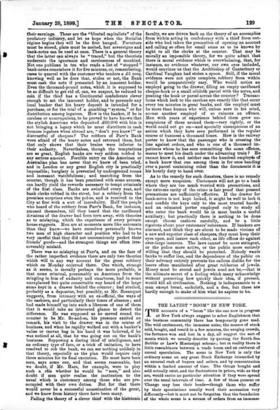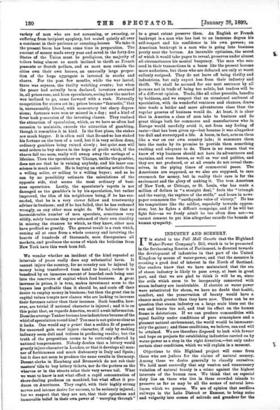THE LATEST "BOOM" IN NEW YORK. T HE accounts of a
"boom" like the one now in progress at New York always suggest to sober Englishmen that the business community there has temporarily gone mad. The wild excitement, the immense noise, the masses of stock sold, bought, and resold in a few minutes, the surging crowds, the fortunes won and lost in a day, all suggest the sort of mania which we usually describe by quoting the South Sea Bubble or Law's Mississippi scheme ; but in reality there is little resemblance between a trade boom and an outburst of unreal speculation. The scene in New York is only the ordinary scene on any great Stock Exchange intensified by an unusual rush of buyers and sellers, and by concentration within a limited amount of time. The things bought and sold actually exist, and the fluctuations in prices, wide as they are, would excite no particular attention if they were spread over the usual intervals of time. A few of those present on 'Change may lose their heads—though those who suffer by their speculations usually word their accusation very differently—but it must not be forgotten that the foundation of the whole scene is a stream of orders from an immense
variety of men who are not screaming, or swearing, or suffering from incipient apoplexy, but seated quietly all over a continent in their parlours or counting-houses We take it the present boom has been some time in preparation. The amount of money made every year and saved in the forty-five States of the Union must be prodigious, the majority of toilers being almost as much inclined to thrift as French peasants or Scotch pedlars, and as most men outside the cities own their own houses, an unusually large propor- tion of the huge aggregate is invested in stocks and shares. For the past few months, while the war lasted, there was coyness, the thrifty watching events ; but when the peace had actually been declared, investors swarmed in, all prices rose, and keen speculators, seeing how the market was inclined to go, came forward with a rush. Naturally competition for shares set in ; prices became "fantastic," that is, unreasonably liberal, with momentary but sharp depres- sions; fortunes were won or missed in a day; and a kind of fever took possession of the investing classes. They realised the attraction of speculation, which, as we have so often had occasion to maintain, exceeds the attraction of gambling, though it resembles it in kind. In the first place, the stakes are much bigger. It is often said that So-and-so has staked his fortune on the turn of a card, but it is very seldom done, ordinary gamblers being ruined slowly ; but quiet men will send orders to buy shares in the hope of profit which, if the shares fall too soon, really will sweep away the savings of a lifetime. Then the speculator on 'Change, unlike the gambler, does not see that he is ruining anybody, and his inner con- science is much easier. He is buying an existing article from a willing seller, or selling to a willing buyer ; and as he can by no possibility estimate the calculations of the opposite aide, that seems the most ordinary of busi- ness operations. Lastly, the speculator's repute is not damaged as the gambler's is by his speculation, but rather improved, the idea of his neighbours being, if he has suc- (seeded, that he is a very clever fellow and trustworthy adviser in business; and if he has failed, that he has reckoned wrongly, as any other man might do. We believe that no inconsiderable number of men speculate, sometimes very wildly, solely because they are ashamed of their own timidity in missing the chances by which, as they know, other men have profited so greatly. The general result is a rush which, coming all at once from a whole country and involving the hoards of hundreds of thousands, soon disorganises all markets, and produces the scene of which the bulletins from New York have this week been full.
We wonder whether an incident of the kind repeated at intervals of years really does any substantial harm. It cannot injure the country, for no country can be injured by money being transferred from hand to hand ; rather it is benefited by an immense amount of hoarded cash being sent into the reservoirs of capital which feed business. A great increase in prices, it is true, makes investment seem to the buyers less profitable than it should be, and cools off their desire to employ money in business; but then the great rise in capital values tempts new classes who are looking to increase their fortunes ?Ladner than their incomes. Such benefits, how- ever, are trivial if national character is injured ; and it is on this point that, as regards America, we still await information. Does the average Yankee become less industrious because of the whirl of speculation round him? Toe case is not quite so clear as it looks. One would say a priori that a sudden fit of passion for unearned gain must injure character, if only by making industry seem dull and tedious in producing results; but the truth of the proposition seems to be curiously affected by national temperament. Nobody doubts that a lottery would greatly injure character in London, or that it develops all man- ner of feeblenesses and much dishonesty in Italy and Spain ; but it does not seem to produce the same results in Germany. Deoent clerks in Hamburg and Brunswick do not rob their masters' tills to bay lottery tickets, nor do the porters on the wharves or in the streets relax their very severe toil. What we want to know is not what effect a rapid concentration of share-dealing produces on mankind, but what effect it pro- duces on Americans. They ought, with their highly strung nerves and intense desire for success, to be seriously injured ; but we suspect that they are not, that their optimism and immovable belief in their own power of worrying through" to a great extent preserve them. An English or French bankrupt is a man who has lost to an immense degree his self-respect and his confidence in his own powers; an American bankrupt is a man who is going into business pretty near the bottom. An incurable optimism, the secret of which it would take pages to reveal, preserves under almost all circumstances his mental buoyancy. The men who suc- ceed in their transactions in a boom like the present become more audacious, but those who are defeated are only at worst sullenly resigned. They do not leave off being thrifty and industrious, but only expect less from their industry and thrift. We shall be accused for our next sentence by all persons not in trade of being too subtle, but traders will be of a different opinion. Trade, like all other pursuits, benefits by boldness, and we suspect that an occasional outburst of speculation, with its wonderful ventures and chances, draws into trade a bolder and more adventurous class than the regular grooves of business would do. At least, it is clear that in America a class of men take to business and do great things both for commerce and manufactures who in Europe would carefully avoid it, not from any feeling of caste—that has been given up—but because it was altogether too dull and stereotyped a life. A boom, in fact, acts on them like a war on our own country lads; it summons them into the ranks by its promise to provide them something exciting and adequate to do. There is no reason that we know of why business should not have its adventurers and captains, and even heroes, as well as war and politics, and they are not produced, or at all events do not reveal them. selves, in the piping times of commercial peace. The Americans are supposed, as we also are supposed, to care overmuch for money, but in reality their care is for the excitement and the glory of making it. The true American of New York, or Chicago, or St. Louis, who has made a million of dollars in "a straight deal," feels the "triumph and the vanity, the rapture of the strife," and hears in news- paper comments the "earthquake voice of victory." He has his temptations like the soldier, especially towards oppres- sion; but he fights a difficult campaign, and if he will but fight fair—as we freely admit he too often does not—we cannot consent to put him altogether outside the boande of human sympathy.



















































 Previous page
Previous page